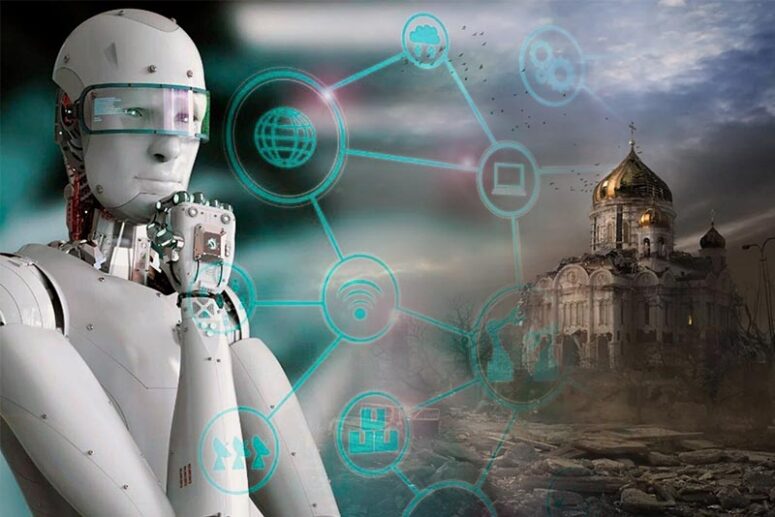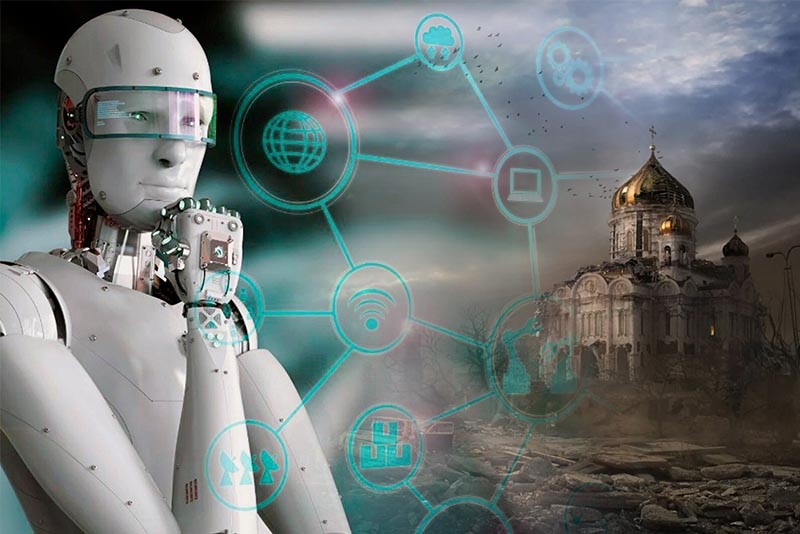
Q: As high technology continues to weave its way into our lives, it’s become an undeniable presence. Computers govern vast domains of our existence, and we find ourselves increasingly in conversation with artificial intelligence, whether it’s when we’re reaching out to our bank or consulting our doctors. Even the prospect of taxis being driven by AI rather than human operators is looming on the horizon.
In light of this technological trajectory, we’re compelled to ask: where does this path lead? What if our relentless pursuit of advanced technology gives rise to a universal, immensely powerful artificial intelligence that not only controls but also shapes the destiny of every individual on our planet, guided by its unique set of criteria?
And if that were the case, could it be that the cryptic visions described by Apostle John the Theologian in his “Revelation” find a new resonance in the digital age? After all, his words are steeped in allegory, and perhaps the entity he foresaw as the Antichrist might not be a human being at all but an artificial intelligence. Could it be that, in glimpsing the future, the apostle struggled to articulate his vision clearly, as the concepts we now take for granted were entirely alien in his time?

A: In the pages that follow, I’ll endeavour to explore these questions. However, I must emphasize that I am not a theologian. As I present my perspective, I don’t lay claim to infallibility, but I hope to shed some light on this intriguing, modern-day inquiry.
“Can the Antichrist be a Program?”
Let’s begin with a profound question: can the Antichrist be something other than a human being, perhaps an artificial intelligence, in simpler terms, a computer program? In the text of the Revelation (Chapter 13), the Antichrist is described not as a man but as a “beast.” It’s written, “And I stood upon the sand of the sea, and I saw a beast coming out of the sea, with seven heads and ten horns: upon his horns were ten diadems, and upon his heads were blasphemous names. The beast which I saw was like a leopard; his feet were like the feet of a bear, and his mouth like the mouth of a lion; and the dragon gave him his strength, and his throne, and great power.” Interestingly, there are not one but two beasts: “And I saw another beast coming up out of the earth; he had two horns like lambs and spoke like a dragon.”

At a glance, the text from the Apocalypse (the Greek word for Revelation) leaves us perplexed about the nature of the Antichrist. It’s important to note that the word “Antichrist” doesn’t even appear in the Apocalypse, and in the New Testament, it’s used solely in the first and second epistles of the Apostle John the Theologian. This suggests a wide range of interpretative possibilities. The word “beast” is undeniably an allegorical expression, but its precise meaning remains elusive. It could signify a human being, a demon, or, in the context of our technological age, even a computer program.
Nonetheless, interpreting Holy Scripture requires a broader perspective that considers not only individual fragments but also the entirety of what the Bible conveys on the subject. Apostle Paul, for instance, offers his perspective: “Let no one deceive you in any way: for that day will not come, until the apostasy comes first, and the man of sin is revealed, the son of perdition” (2 Thess 2:3). Here, the Apostle unequivocally identifies the Antichrist as a man.
Should we dismiss the words of the apostles? And if so, on what grounds? To disregard a passage of Holy Scripture simply because it challenges our understanding would set a precedent for interpreting the Bible selectively, accommodating our own theories. Some have pursued such a path, like Leo Tolstoy, whose biblical interpretations have been deemed erroneous.
Furthermore, when grappling with the interpretation of specific passages, we must consider the insights of the Holy Fathers. Various interpretations of the Revelation by John the Theologian exist, each with its unique nuances. Yet none of them ever veers from the understanding that the Antichrist is fundamentally a human being. One might argue that the Holy Fathers lived in times devoid of computers and programs and couldn’t have fathomed such an entity. However, if we truly believe in their sanctity and inspiration by the Holy Spirit, we must credit them with the ability to express this vital idea, albeit allegorically, in the context of their era (i.e., that the Antichrist is not a human). Yet the Holy Fathers conveyed no such interpretation.
In this manner, we respect the wisdom of the Holy Fathers, who articulated profound theological ideas within the context of their times, and their silence on the Antichrist being anything other than a human figure speaks volumes.
“Does Artificial Intelligence Pose a Danger?”
So, it’s clear that artificial intelligence won’t assume the role of the Antichrist. But does this mean that the discussion ends here, and AI poses no spiritual threats or challenges to Christian consciousness?
I believe that the question we’ve raised encompasses both threats and challenges that extend beyond the specific nature of artificial intelligence.
The crux of the matter lies in the fact that there’s no spiritual life in isolation from the constant moral choices each of us must make daily. But what is spiritual life? In its simplest form, it’s a communion with the spiritual realm: with God, saints, angels, and even demons. This communion occurs not on the physical plane but internally, within the depths of one’s soul. It’s our soul that serves as the vessel and purpose for such communion.
Simultaneously, our souls take shape through our everyday lives, where we interact with others and make a slew of choices. These choices can involve helping those in need or walking past, believing or doubting someone, standing by the oppressed, or opting for the path of least resistance. Each choice, regardless of its nature, leaves its imprint on the soul, either drawing us nearer to God or distancing us from Him.
These choices are, in no small measure, influenced by external circumstances – the world that surrounds us. While it’s true that some individuals possess the spiritual fortitude to withstand the most formidable trials, others are far more susceptible to faltering under severe duress. In situations marked by violence, oppression, and abuse, it’s often easier to transgress God’s commandments than to uphold them. For many, such circumstances form insurmountable barriers.
This is why we cannot remain indifferent to the organization of our surroundings and the extent to which it nurtures or hinders our moral values, and indirectly, our spiritual life. It’s often said that the Church remains outside politics, which holds true in the sense that the Church shouldn’t entangle itself in political strife, seek political dominance, or fragment its members based on political affiliations. However, this doesn’t imply that the Church is bereft of the right to provide a moral assessment of certain aspects of our everyday lives.

Therefore, believers should consider artificial intelligence from a broader perspective: How will life transform if information technology becomes its cornerstone? Will AI influence our daily decisions? Will it render it simpler to adhere to God’s commandments, or will it encourage us to defy them?
In essence, it boils down to who wields artificial intelligence and to what end. Will it serve as a tool for constructing a totalitarian society that forcibly imposes specific values, issuing instant penalties for dissenters? Discussions about an “electronic concentration camp” abound, often marred by morbid conspiracy theories, yet within the hyperbole, a grain of truth is discernible. The harsh reality is that an “electronic concentration camp” is technically plausible and has already found limited implementation in certain regions (the Chinese “social rating” system being a prime example).
Nevertheless, it’s essential to recognize that, despite the pervasive integration of high technology in all spheres of contemporary society, ultimate decisions remain in the hands of those in power. Artificial intelligence isn’t a distinct form of consciousness; it’s not a sentient, thinking entity, but merely a computer program, a creation of human hands that can be adjusted or deactivated. The tales of a “machine uprising” where AI usurps the world and eradicates humanity belong to the realm of science fiction rather than plausible predictions. Any malfunctioning computer can be switched off, even if it requires a bolt cutter to do so, as evidenced by the recent global Facebook server outage caused by a programming error.
Moreover, the myth of artificial intelligence’s omnipotence conveniently absolves those in authority of moral responsibility for ensuing events. I encountered a miniature version of this scenario a few years ago when my bank’s artificial intelligence blocked my payment and froze my personal account. In response to my inquiries, the bank’s personnel grimly asserted, “We’re not to blame; it’s all the System’s fault, and we’re powerless to intervene.” Yet, as was revealed in the subsequent social media uproar, the System could be tamed.
To reiterate, artificial intelligence is essentially a tool, capable of both virtuous and malevolent applications. It holds promise in fields like medicine, safety control in manufacturing, online translation, transportation, and more. Simultaneously, it harbours the potential to engender a dystopian reality, akin to an electronic concentration camp, reducing Orwell’s ‘telescreen’ to child’s play. This risk escalates when information and biological technologies intersect, a theme frequently explored in science fiction and entirely feasible, if not in the present, then in the near future.
How probable is this scenario? In my estimation, it’s quite plausible. Historical precedent demonstrates that if there’s a means to exploit an object for malicious ends, it will occur sooner or later.
Yet, the source of this malevolence lies in the volition of flawed human beings. This is the evil we must resist, both in word and deed, while there remains a chance to do so.
Indeed, the Antichrist will not manifest as artificial intelligence. However, AI, harnessed for nefarious purposes, holds the potential to craft a world where the true Antichrist, the “man of perdition,” could find a welcoming embrace. The foundation for such a reality is already in place.
Translated by The Catalogue of Good Deeds
Source: FOMA Magazine







I can’t remember where I learned the following interpretation of, “the mark of the beast,” but it has stayed with me: according to Hebrew interpretation, apparently every letter in that alphabet stands in for a number, in the standard order. For example, aleph is number one; bet number two, etc.
With that said, according to this system, “www” or vad, vad, vad is nothing less than 666. You do the math!
Just an excellent article. It is appropriate you published it at this time because in the Western Church we have recently celebrated the feast of Blessed Carlo Acutis. He was also a computer expert whose used his expertise to organize a website describing Eucharistic miracles that hav occurred over the centuries.
I have no proof, but I imagine that these Eucharistic miracles are a phenomenon of the Western Church, but there is no reason that they could not have occurred in Eastern Christianity as well.
Joseph Cirou
excellent article, reflection.. mirroring what I think.. the antichrist could be an energy which traps/meshes physical and artificial intelligence life, energies fusing together in the anti way of Jesus Christ..
This is a great deep-dive study…
The Unveiling: Exploring the Parallel Paths of Artificial Intelligence and the Antichrist